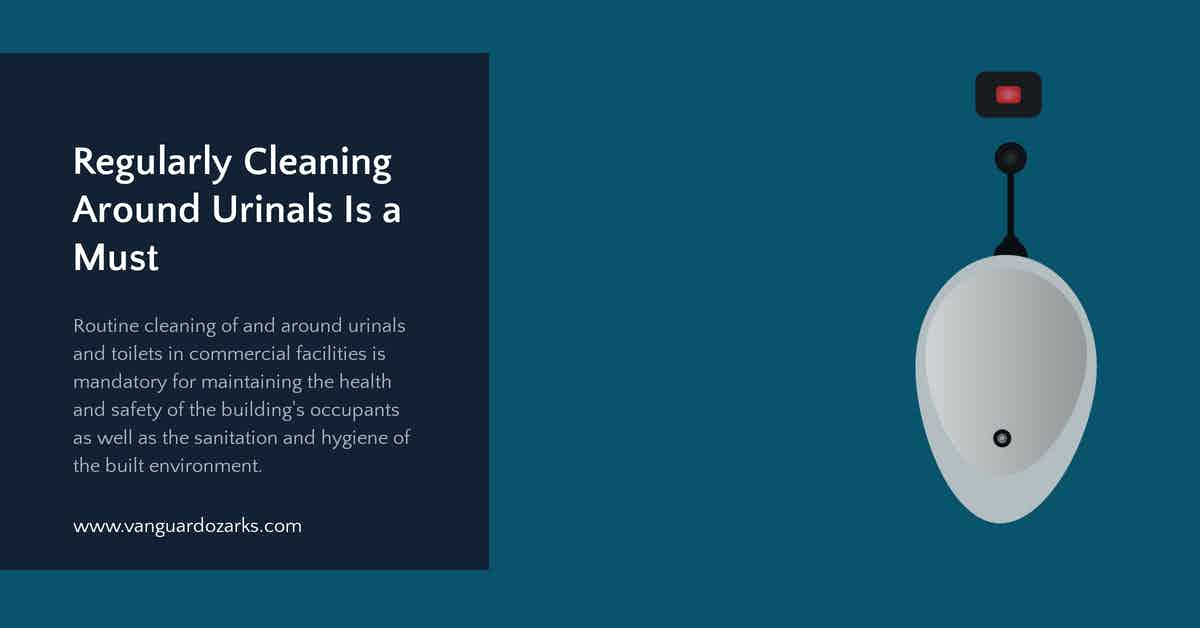Routine cleaning of and around urinals and toilets in commercial facilities is mandatory for maintaining the health and safety of the building's occupants, as well as the sanitation and hygiene of the built environment.

The Importance of Regular Urinal and Toilet Cleaning in Commercial Buildings
Commercial toilets and urinals are a constant source of concern for occupants, custodial teams, facilities managers, and building owners.
In general, the areas are difficult and often unpleasant to clean, represent significant health and safety challenges to occupants and those charged with maintaining the cleanliness and operation of the restrooms, are a constant source of occupant and customer complaints, and have been identified as a significant source for the spread and transmission of disease, including COVID-19.
Further, dirty restrooms not only result in lost business, but poor hand hygiene compliance that furthers the transmission of germs throughout the facility, negatively impacting occupant performance, resulting in additional loss of business income.
Consumers, Cash, and Clean Commodes
Consumers prefer to patron businesses with clean restrooms.
According to the results of the 2019 Health Handwashing Survey conducted by the Bradley Corporation:
- 52% of respondents stated they would either definitely or probably spend more money at a business with clean, well-maintained restrooms.
- An average of 64% (67% women vs. 61% men) said they make conscious decisions about what businesses to shop at based on the cleanliness and maintenance levels of their restrooms.
- 69% stated they had an unpleasant experience with a business due to the condition of the restroom.
- 24% of those who had a negative restroom visit left the business without spending any money.
- 39% said they would think twice about returning to a business where they had a negative restroom experience.
- 43% of those reporting negative restroom experiences stated they would request to speak with and complain to management, and;
- 55% said they were unlikely to return to a business where they had a negative restroom experience.
Source:
Toilet Plumes as a Source for the Transmission of Disease
Urinals and commercial toilets transmit disease through surface contact and the spread of pathogens--including SARS-CoV-2--and pathogenic bacteria via aerosolized particles expelled through toilet plumes when the systems are flushed.
According to the results of a study published to the US National Libray of Medicine, which conducted research into the impact of toilet plumes on surface hygiene and occupant health;
[...] potentially infectious aerosols may be produced in substantial quantities during flushing.
Aerosolization can continue through multiple flushes to expose subsequent toilet users.
Some of the aerosols desiccate to become droplet nuclei and remain adrift in the air currents.
Research suggests that toilet plumes could play a contributory role in the transmission of infectious diseases.
Lifting the lid on toilet plume aerosol: A literature review with suggestions for future research
Further research conducted into some of the more inexplicable routes of transmission related to SARS-CoV-2 found that;
Isolation of infectious SARS-CoV-2 in feces indicates the possibility of fecal-oral transmission or fecal–respiratory transmission through aerosolized feces.
During the 2003 severe acute respiratory syndrome pandemic, 329 residents of a private housing estate in Hong Kong were infected; 42 died).
Investigation of the building’s structure showed that faulty sewage pipelines led to aerosolization of contaminated feces, which was believed to be the source of infection.
Our findings indicate the need for appropriate precautions to avoid the potential transmission of SARS-CoV-2 from feces.
Discharge and hospital cleaning practices should consider this possibility for critically ill patients or those who died who had high viral loads and are more likely to shed infectious viruses.
Infectious SARS-CoV-2 in Feces of Patient with Severe COVID-19
Unforeseen Consequences of Dirty Restrooms
An unforeseen consequence of dirty restrooms, especially where occupants have little to no alternative, is a decline in handwashing compliance, resulting in an overall decrease in facility hygiene.
According to Jon Dommisse, Director of Strategy and Corporate Development for Bradley Corp.;
Poor conditions are the main culprit behind people skipping hand washing during a restroom visit.
Lack of soap and/or paper towels and dirty and/or non-functioning sinks are the two most common reasons for not washing hands.
Poor facility hand hygiene has several negative consequences, including:
- The transmission of germs--just a gram of human feces can contain 1 trillion germs.
- An increase in illness, especially respiratory and gastrointestinal diseases.
- An increase in student absenteeism.
- Missed work days--a multi-billion dollar issue in the US.
- Lost income due to healthcare expenses.
- An increase in gastrointestinal-related deaths, especially among children and the elderly.
- An increase in bacterial infections, such as pinkeye and trachoma, which can lead to blindness, and skin infections, such as staph, and;
- An increase in sepsis-related deaths due to infection.
Source:
Takeaway
Maintaining clean, safe, hygienic restrooms is an involved and ongoing process.
Urinals and toilets in commercial facilities are directly responsible for the transmission of deadly pathogens and pathogenic bacteria that are easily spread from surfaces to occupants and then throughout a facility.
Routine checks coupled with daily high-performance cleaning and disinfection as well as weekly deep cleaning and disinfection services will minimize risk, maintain occupant health and satisfaction, and promote the facility's professional profile.
Outsourcing to an experienced provider is a proven method for onboarding critical infection prevention and control services as part of a greater facility cleaning subscription service at a fraction of the cost of maintaining a similar service in-house.
Contact us today and discover why Vanguard Cleaning Systems® is the Standard of Clean® for businesses throughout Northwest Arkansas, Missouri, and Oklahoma.
In Oklahoma, dial 918-960-4450
In Arkansas, dial 479-717-2410
In Missouri, dial 417-812-9777
